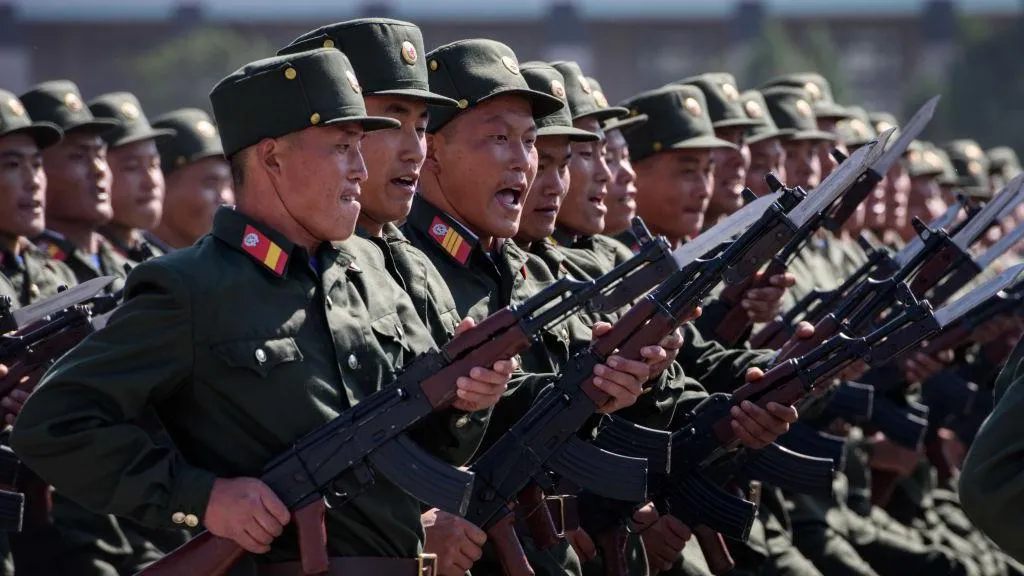North Korean Troops: A New Alliance in Russia’s War in Ukraine?
4 min read
Russia denies North Korean soldiers are preparing for combat in Ukraine (file pic)

Russia denies North Korean soldiers are preparing for combat in Ukraine (file pic)
Recent reports suggest that Russia is forming a unit of approximately 3,000 North Korean troops, potentially deepening military ties between Moscow and Pyongyang. This information, relayed by a source in Ukrainian military intelligence to the BBC, has raised eyebrows and concerns regarding the evolving dynamics of the ongoing war in Ukraine.
Despite the gravity of these claims, there has been no observable evidence of such a large unit being mobilized in Russia’s Far East. Kremlin spokesman Dmitry Peskov has outright rejected the notion of North Korean involvement, labeling the reports as lacking substantiation. He stated, “This is not only British intelligence; it is also American intelligence. They report it all the time, they don’t provide any evidence.”
Nonetheless, the relationship between Russia and North Korea has undeniably strengthened in recent months. Notably, North Korean leader Kim Jong Un recently extended a birthday message to Vladimir Putin, referring to him as his “closest comrade.” Ukraine’s President Volodymyr Zelensky has voiced concerns about North Korea’s potential military participation, and South Korea’s defense minister has indicated that a North Korean deployment is “highly likely.”
The key uncertainty lies in the actual troop numbers involved. A military source in Russia’s Far East confirmed to BBC Russian that some North Koreans had indeed arrived and were stationed at a military base near Ussuriysk, located north of Vladivostok. However, this source did not corroborate the figure of 3,000, suggesting that the numbers are “absolutely nowhere near” that amount.
Military experts express skepticism about the feasibility of integrating such a large number of North Korean soldiers into Russian units. One analyst, who requested anonymity, pointed out that even incorporating hundreds of Russian prisoners had posed challenges, given that they spoke the same language.
If the number of North Koreans does reach 3,000, it would still represent a relatively small contingent in the broader battlefield context. Nevertheless, the implications of such a partnership concern U.S. officials. State Department spokesman Matthew Miller characterized it as a significant deepening of the relationship, indicative of “a new level of desperation by Russia” in light of its battlefield setbacks.
Recent developments further suggest that North Korea is supplying Russia with munitions. Evidence emerged in Ukraine’s Poltava region, where a missile believed to have originated from North Korea was recovered. Reports indicate that Pyongyang has been providing mines and shells since at least December 2023, based on communications within Russian military circles.
Ukrainian forces have reportedly experienced issues with the quality of ammunition, leading to injuries among soldiers. This context raises questions about whether North Korean troops could serve effectively in combat roles. Kyiv believes that a North Korean unit might be preparing in the Ulan-Ude region, near the Mongolian border, for deployment to Russia’s Kursk province, where Ukrainian forces made incursions earlier this year.
Experts suggest that North Korean soldiers might be utilized to guard sections of the Russian-Ukrainian border, thereby freeing up Russian troops for other operations. However, Valeriy Ryabykh, editor of the Ukrainian publication Defence Express, warns against expecting these units to engage directly in frontline combat.
Although North Korea maintains a large standing army of approximately 1.28 million active soldiers, its troops lack recent combat experience, especially compared to Russian forces. Moreover, the historical alignment of North Korean military practices with old Soviet models raises questions about how effectively they could adapt to the complexities of the war in Ukraine.
Language barriers and unfamiliarity with Russian military systems could complicate any potential deployment. While experts recognize North Korea’s engineering and construction capabilities, they also highlight that its troops are not primarily known for combat proficiency.
The strategic motivations for such an alliance are evident. North Korea is eager for financial support and technological access, while Russia requires additional soldiers and munitions to sustain its military efforts. Andrei Lankov, director of the Korea Risk Group, points out that North Korea could benefit from monetary compensation and possibly gain access to Russian military technology.
For Putin, there is a pressing need to bolster Russian ranks in light of significant losses over the past two and a half years. Valeriy Akimenko from the UK’s Conflict Studies Research Centre argues that deploying North Koreans might be a strategy to mitigate the challenges stemming from prior mobilization efforts that have faltered.
President Zelensky remains vigilant regarding this burgeoning military alliance. Historically, the absence of Western troops in Ukraine has been motivated by fears of escalation. However, if reports of North Korean troops preparing for deployment are substantiated, it may indicate a shift in the calculus for Putin, suggesting a willingness to accept foreign military personnel on the ground. As the situation develops, the implications of this partnership could significantly influence the ongoing conflict in Ukraine.